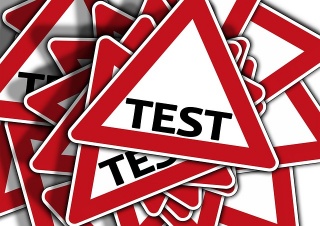The questions which follow provide a basic knowledge test of selected concepts covered in this learning pathway:
Lesson plan challenge.
The questions published at the end of each learning pathway are re-used for the knowledge test for learners interested in earning a digital badge or certificate of participation for the Digital skills for OER sharing (DS4OERS) micro-course. Please consult the Certify participation page for more information.
Indicate whether the following statements are true or false:
- Co-operative learning supports the development of learners' communication skills and problem-solving skills.
- True
- Correct. Working together to achieve a goal requires learners to discuss the task with each other and explore different approaches to problem-solving.
- False
- Incorrect. Working together to achieve a goal requires learners to discuss the task with each other and explore different approaches to problem-solving.
- An end-of-year examination is an example of a formative assessment.
- True
- Incorrect. The main purpose of an end-of-year exam is to assess what a student has learnt, against a benchmark or standard, so this is a summative assessment.
- False
- Correct. The main purpose of an end-of-year exam is to assess what a student has learnt, against a benchmark or standard, so this is a summative assessment.
Multiple choice questions
- Which of the following are examples of activity-based learning in a geography lesson? (Select all that apply.)
- Learners watching a video of scientists collecting data on rainfall in a remote area
- Incorrect. Although the learners are watching a real-life activity, they are simply observing the actions of others, rather than learning by doing it themselves.
- Learners setting up a rainfall monitoring station together in the school yard
- Correct. This is activity-based learning because the learners are learning through doing a task themselves. This gives opportunities to learn from their mistakes, solve problems and be creative. Activity-based learning can be done in a group or individually.
- Each learner setting up a small rainfall monitoring station in their own garden
- Correct. This is activity-based learning because the learners are learning through doing a task themselves. This gives opportunities to learn from their mistakes, solve problems and be creative. Activity-based learning can be done in a group or individually.
- Learners listening to description by their teacher on setting up a rainfall monitoring station in the school yard
- Incorrect. In this teaching approach, learners are simply listening to someone describing what has been done, so are not active themselves.If they set up the rainfall monitoring station themselves, there may be more chance of error, but also opportunities to learn from their mistakes, solve problems and be creative.
- Which of the following can be used to encourage assessment as learning? (Select all that apply.)
- Presentation
- Correct. Preparing for a presentation can help a learner reflect on their own learning.
- Final exam
- Incorrect. Final exams are used for summative assessment, but are not really a tool for encouraging learners to reflect on their own learning, which is the core of assessment as learning.
- Graphic organiser made by the learner
- Correct. Creating a graphic organiser can help a learner reflect on their own learning.
- Mind-mapping
- Correct. Creating a mind-map can help a learner reflect on their own learning.
